Research
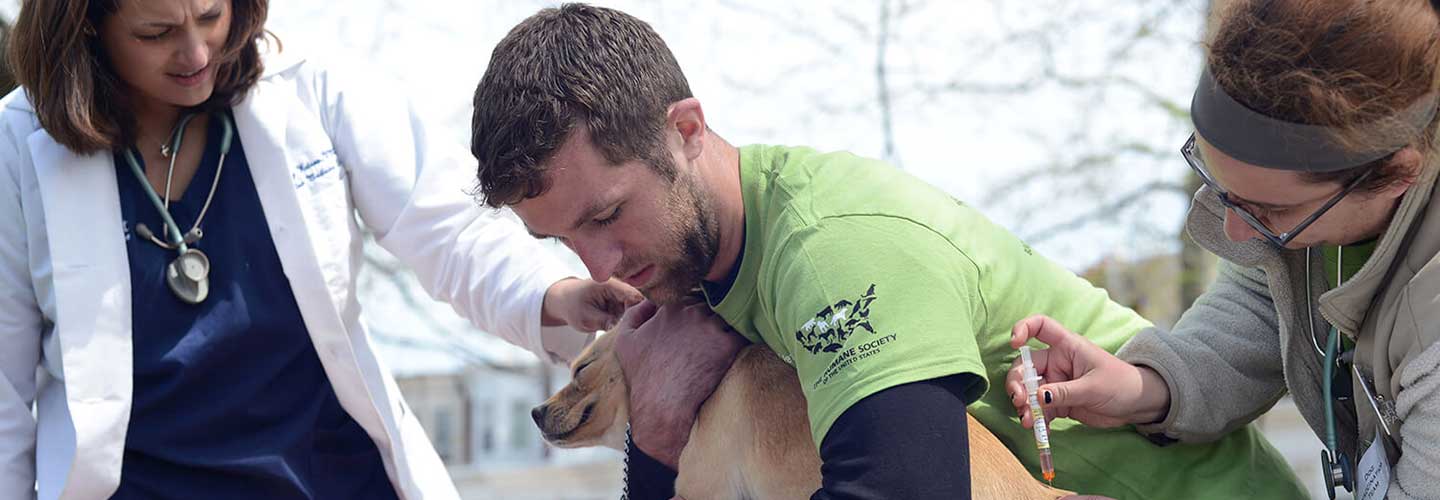
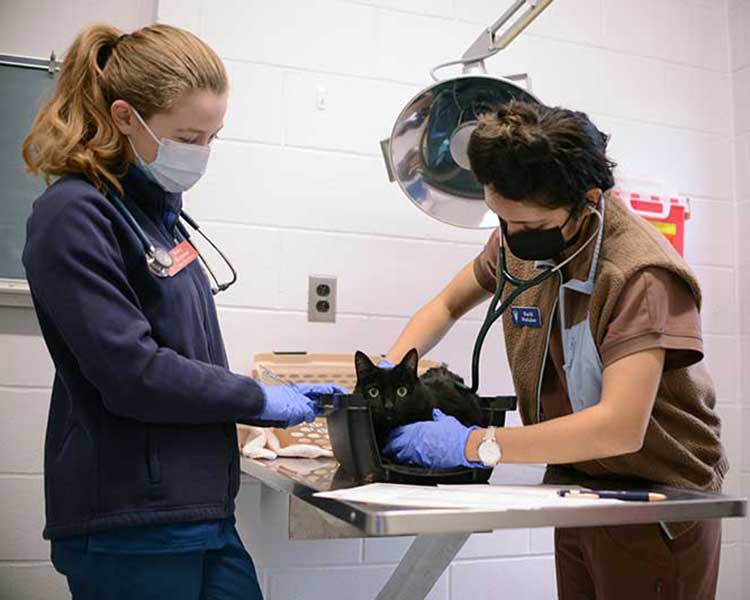
The program’s research initiatives aim to enhance animal welfare and treatment in various areas, including shelter best practices, teaching methods, impact assessment, and animal welfare evaluation. It collaborates with faculty members campus-wide to conduct studies that advance the field of shelter medicine and community engagement.
Students can apply to be a Rosenthal Penn Vet Shelter Medicine Student Research Fellow. They can also engage in mentored projects such as independent studies, dual degree programs, and Animal Welfare & Behavior (AWB) student projects.
Research components of the program include post-doctoral research studies, collaborative projects with other faculty and organizations, and direct mentorship for students in research development, planning, execution, and publication.
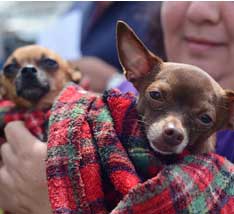
WaterShed Initiative
Through the WaterShed Initiative supported by the Arnall Family Foundation, the program worked with Dr. Lauren Powell as a postdoctoral researcher from 2020-2023. She completed her doctoral dissertation at the University of Sydney School of Public Health where she focused on the impacts of human-dog interactions on mental well-being. As the Penn Vet Shelter Medicine Program postdoctoral researcher, her research efforts were multi-factorial, including quality of life assessments in the shelter and teaching in the shelter medicine field.
Rosenthal Penn Vet Shelter Medicine Student Research Fellowship
The Penn Vet Shelter Medicine Program developed the endowed Rosenthal Shelter Medicine Fellowship Program. This program provides scholarship support and research funding for two students per veterinary class to engage in a three-year training program in shelter medicine, also allowing for peer-learning.
Students take all shelter electives while developing, executing, evaluating, and submitting for publication a research project that directly helps shelter animals. There are regularly scheduled “lab” meetings and journal clubs (discussion of peer-reviewed literature).
The first fellow, Charlotte Burns (V’19), was a PetSmart Charities Scholarship winner and was supported through the Ambassador Program to present her work at the 2018 ABVP Symposium. Her paper on an outpatient parvovirus treatment paper was accepted for publication through JVECCS.
- Solliquin efficacy in the shelter (Tabitha Stillo V’20)
- Incidence of Toxoplasmosis in the shelter (Dani Mitchell V’20)
- The impact for clients and providers in a one-health clinic (Meriel Walsh V’21)
- Cost-benefit analysis of upper respiratory treatment options (Tianna Chin V’21)
- Profile of exotic animal intake in the Philadelphia region (Anna Shirosky V’22)
- Impact of at-home visits for clients and providers through Pets for Life (Lauren Lundahl V’22)
- Survey to examine animal attitudes on free-roaming animals in the US and India (Reshmi Sensharma V’23)
- Pet Owners’ Perceptions of COVID-19, Zoonotic Disease, and Veterinary Medicine (Tyler Lavender V 24)
- Determining and understanding physical and behavioral characteristics that long-term shelter dogs share (Gabriela Landazuri-Saltos V’24)
- Supporting the human-animal bond among homeless and housing insecure pet owners in the US (Zelda Blowers V’24)
- Incidence of Clostridioides difficile, SARS-CoV-2, and intestinal parasites in Philadelphia area shelters (Kaelea Composto V’25 and Hannah Baukert V’25)
- Evaluating stress biomarkers in shelter dogs (Holly Yost V’26 and Katie Graham V’26)
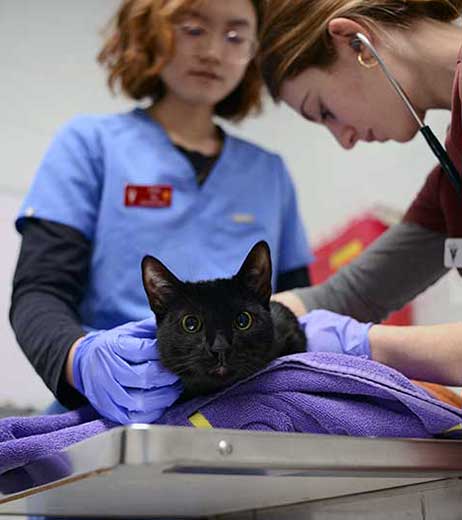
Meet Our Current Penn Vet Research and Program Partners
Collaborative projects are critical to the efforts of the Penn Vet Shelter Medicine and Community Engagement Program
- Daniel Beiting
Host-Microbial Interactions - Stephen Cole
Toxoplasmosis in the shelter Enteropathogens in shelter animals Disinfectants in the shelter - David Holt
Clinical trials in infrared imaging and lung cancer surgery, as well as with canine mammary tumors One Health Clinics - Cynthia Otto
Penn Vet Working Dog Center, Canine Behavior and Rehabilitation Medicine
- Lauren Powell
Current lecturer and previous post-doc - Laurel Redding
C.difficile in shelter animals - James Serpell
Center for Interaction of Animals & Society: Human-Animal Interaction - Carlo Siracusa
Behavior Medicine: Research with Francisvale Home Solliquin in dogs - Carol Sobotyk
Parasites in the shelter
Publications
- Understanding feline feelings: An investigation of cat owners’ perceptions of problematic cat behaviors. Powell L, Watson B, Serpell J. Applied Animal Behaviour Science. 2023; 266:106025.
- Understanding the motivations of foster caregivers at animal shelters. Ackerman R, Watson B, Serpell J, Reinhard CL, Powell L. Animals. 2023;13(17):2694.
- Returning a Shelter Dog: The Role of Owner Expectations and Dog Behavior. Powell, L., Lee, B., Reinhard, C. L., Morris, M., Satriale, D., Serpell, J., & Watson, B. (2022). Animals: an open access journal from MDPI, 12(9), 1053. https://doi.org/10.3390/ani12091053
- A Retrospective Analysis of Pre-/Post-Test Scores of Students Participating in Online Asynchronous Shelter Surgery Coursework. Reinhard, C. L., Powell, L., & Watson, B. (2022). Journal of Veterinary Medical Education, 49(1), 102–108. https://doi.org/10.3138/jvme-2020-0074
- One Health Clinic Promotes Veterinarian-Client Trust Among Underserved Pet Owners and Provides Learning Opportunities for Veterinary Students. Powell, L., Walsh, M., Reinhard, C. L., Jankowski, K., & Watson, B. (2022). Journal of the American Veterinary Medical Association, 260(8), 931–939. https://doi.org/10.2460/javma.21.06.0274
- Seroprevalence of Toxoplasmosis among Shelter-Housed Felines in a Philadelphia Suburb. Mitchell, D. J., Reinhard, C. L., Cole, S. D., Stefanovski, D., & Watson, B. (2022). Animals, 12(16), 2012. https://doi.org/10.3390/ani12162012
- A Veterinary and Nursing Collaboration to Increase Access to Healthcare. Chee S, Rivera R, Huntley AA, Lundahl L, Bocage C, Holt D, Watson B, Lipman T. (2022).
Journal of Nursing Education and Practice, 11(3). https://doi.org/10.5430/jnep.v12n3p84 - Pet Owners’ Perceptions of COVID-19, Zoonotic Disease, and Veterinary Medicine: The Impact of Demographic Characteristics. Powell, L., Lavender, T. M., Reinhard, C. L., & Watson, B. (2022). Veterinary Sciences, 9(5), 195. https://doi.org/10.3390/vetsci9050195
- A Pilot Study Examining the Experience of Veterinary Telehealth in an Underserved Population Through a University Program Integrating Veterinary Students. Lundahl, L., Powell, L., Reinhard, C. L., Healey, E., & Watson, B. (2022). Frontiers in Veterinary Science, 9, 871928. https://doi.org/10.3389/fvets.2022.871928
- A Qualitative Analysis of Clinical Year Veterinary Student Journal Entries for a Shelter Medicine Rotation. Jafarian, S., Akpek, E., Reinhard, C. L., & Watson, B. (2022). Frontiers in Veterinary Science, 9, 858419. https://doi.org/10.3389/fvets.2022.858419
- Behavior Education and Intervention Program at a Small Shelter I. Effect on Behavior Knowledge and Safety. Lilly, M. L., Watson, B., & Siracusa, C. (2022). Journal of Applied Animal Welfare Science: JAAWS, 25(3), 195–207. https://doi.org/10.1080/10888705.2021.2012681
- Shelter Medicine Sustainability from an academic perspective: Challenges and issues. McCobb, E., Crawford, P. C., Harrold, M. L., Levy, J. K., Perkins, A., Reinhard, C. L., & Watson, B. (2022). Journal of Veterinary Medical Education. https://doi.org/10.3138/jvme-2022-0080
- Workplace Relations and Opportunities for Career Development Impact the Retention of Veterinarians in Shelter Medicine. Powell, L., Reinhard, C. L., Serpell, J., & Watson, B. (2021). Frontiers in Veterinary Science, 8, 732105. https://doi.org/10.3389/fvets.2021.732105
- A Survey of Veterinary Student and Veterinarian Perceptions of Shelter Medicine Employment. Powell, L., Reinhard, C. L., Serpell, J., & Watson, B. (2021). Journal of Veterinary Medical Education, e20210112. Advance online publication. https://doi.org/10.3138/jvme-2021-0112
- Characterizing Unsuccessful Animal Adoptions: Age and Breed Predict the Likelihood of Return, Reasons for Return and Post-Return Outcomes. Powell, L., Reinhard, C., Satriale, D., Morris, M., Serpell, J., & Watson, B. (2021). Scientific Reports, 11(1), 8018. https://doi.org/10.1038/s41598-021-87649-2
- Owner Personality, Owner-Dog Attachment, and Canine Demographics Influence Treatment Outcomes in Canine Behavioral Medicine Cases. Powell, L., Stefanovski, D., Siracusa, C., & Serpell, J. (2021). Frontiers in Veterinary Science, 7, 630931. https://doi.org/10.3389/fvets.2020.630931
- Relinquishing Owners Underestimate Their Dog’s Behavioral Problems: Deception or Lack of Knowledge? Powell, L., Duffy, D. L., Kruger, K. A., Watson, B., & Serpell, J. A. (2021). Frontiers in Veterinary Science, 8, 734973. https://doi.org/10.3389/fvets.2021.734973
- Animal Shelters’ Response to the COVID-19 Pandemic: A Pilot Survey of 14 Shelters in the Northeastern United States. Powell, L., Houlihan, C., Stone, M., Gitlin, I., Ji, X., Reinhard, C. L., & Watson, B. (2021). Animals: an open access journal from MDPI, 11(9), 2669. https://doi.org/10.3390/ani11092669
- The Effects of Solliquin Administration on the Activity and Fecal Cortisol Production of Shelter Dogs. Stillo, T., Norgard, R. J., Stefanovski, D., Siracusa, C., Reinhard, C. L., & Watson, B. (2021). Journal of Veterinary Behavior, 45, 10-15. https://doi.org/10.1016/j.jveb.2021.05.001
- Spectrum of Care: More than Treatment Options. Brown, C. R., Garrett, L. D., Gilles, W. K., Houlihan, K. E., McCobb, E., Pailler, S., Putnam, H., Scarlett, J. L., Treglia, L., Watson, B., & Wietsma, H. T. (2021). Journal of the American Veterinary Medical Association, 259(7), 712–717. https://doi.org/10.2460/javma.259.7.712
- The Impact of Returning a Pet to the Shelter on Future Animal Adoptions. Powell, L., Reinhard, C. L., Satriale, D., Morris, M., Serpell, J., & Watson, B. (2022). Scientific Reports, 12(1), 1109. https://doi.org/10.1038/s41598-022-05101-5
- Activation of Mosquito Immunity Blocks the Development of Transmission-Stage Filarial Nematodes. Edgerton, E. B., McCrea, A. R., Berry, C. T., Kwok, J. Y., Thompson, L. K., Watson, B., Fuller, E. M., Nolan, T. J., Lok, J. B., & Povelones, M. (2020). Proceedings of the National Academy of Sciences of the United States of America, 117(7), 3711–3717. https://doi.org/10.1073/pnas.1909369117
- Retrospective Evaluation of Outpatient Canine Parvovirus Treatment in a Shelter‐Based Low‐Cost Urban Clinic. Perley, K, Burns, C. C., Maguire, C., Shen, V., Joffe, E., Stefanovski, D., Redding, L., Germanis, L., Drobatz, K. J., & Watson, B. (2020). Journal of Veterinary Emergency and Critical Care, 30(2), 202–208. https://doi.org/10.1111/vec.12941
- The Effects of Frequency and Duration of Handling on the Development of Feline Upper Respiratory Infections in a Shelter Setting. Burns, C. C., Redding, L. E., & Watson, B. (2020). Animals, 10(10), 1828. https://doi.org/10.3390/ani10101828
- Development of International Learning Outcomes for Shelter Medicine in Veterinary Education: A Delphi Approach. Stavisky, J., Watson, B., Dean, R., Merritt, B. L., van der Leij, R. W. J. R., & Serlin, R. (2020). Journal of veterinary medical education, e20200027. Advance online publication. https://doi.org/10.3138/jvme-2020-0027
- A Randomized, Placebo-Controlled Clinical Trial of Famciclovir in Shelter Cats with Naturally Occurring Upper Respiratory Tract Disease. Reinhard, C. L., McCobb, E., Stefanovski, D., & Sharp, C. R. (2020). Animals: an open access journal from MDPI, 10(9), 1448. https://doi.org/10.3390/ani10091448
Research in Action
Shelter Medicine partners with regional sheltering organizations, national welfare organizations, campus-wide outreach initiatives, schools, foundations, and community organizations, as well as clinical services and researchers right here at Penn Vet.
- Watch the Video: Advancing Welfare + Evidence-based Shelter Care
- Watch the Video: Anna Shirosky, V’22 Through her research as a third-year Penn Vet student and Rosenthal Fellow with Penn Vet’s Shelter Medicine Program, Anna Shirosky is helping shelters better prepare for the specific management and husbandry needs of exotic companion animal species.
- Watch the Video: Lauren Powell Using her hands-on experience in Australia as a foundation for her research project, Dr. Lauren Powell — a Watershed Initiative post-doctoral researcher with Penn Vet’s Shelter Medicine Program — is developing an application-based tool to assess the quality of life for cats and dogs housed in a shelter, ultimately identifying opportunities to make their shelter experiences as positive as possible.
- Watch the Video: Kim Perley By researching the viability of outpatient care compared to traditional, in-hospital services, Dr. Kim Perley — a former summer researcher with Penn Vet’s Shelter Medicine Program — hopes to make critical parvovirus treatments more accessible to broader pet populations, helping to save more animal lives.
- Watch the Video: Charlotte Burns As a former Rosenthal Fellow with Penn Vet’s Shelter Medicine Program, Dr. Charlotte Burns (V’19) used her research to explore how to improve the quality of life for cats housed in shelters, providing concrete, evidence-based solutions to give back to the shelter community.
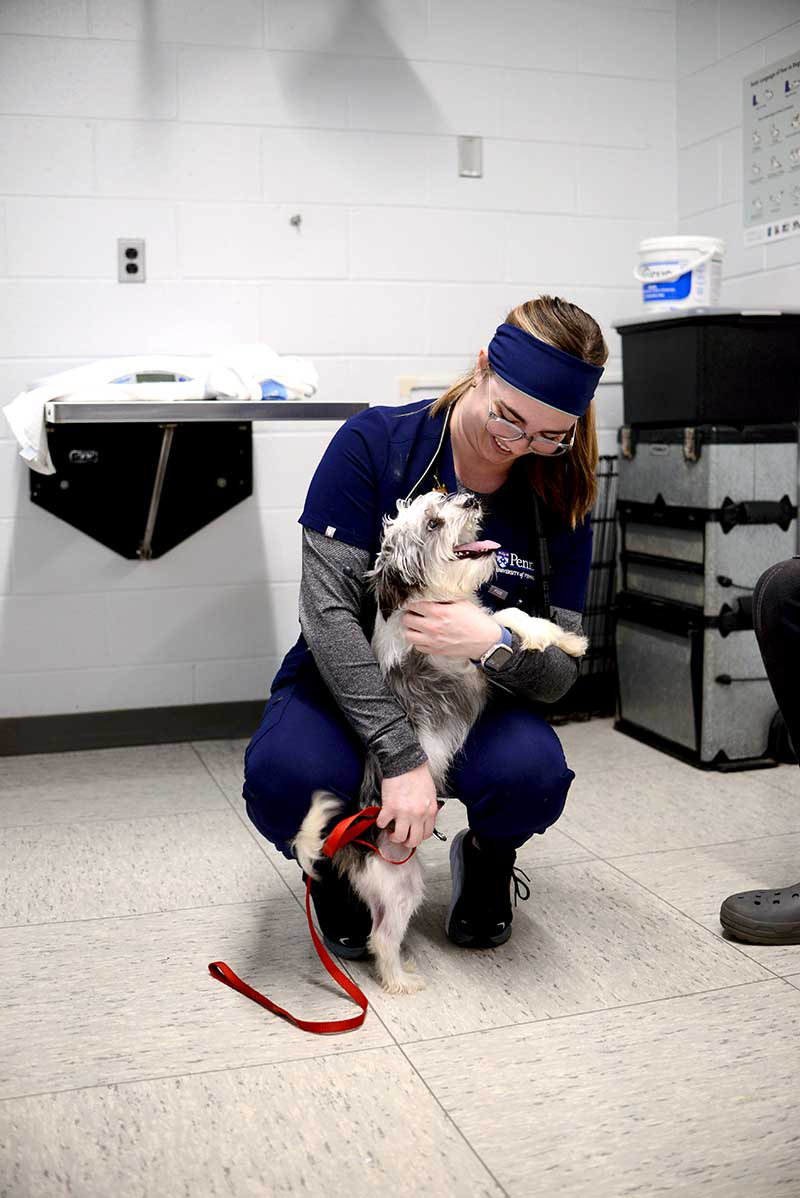
Shelter Medicine and Community Engagement
Phone: (215) 898-6982
3800 Spruce Street
Philadelphia, PA 19104
